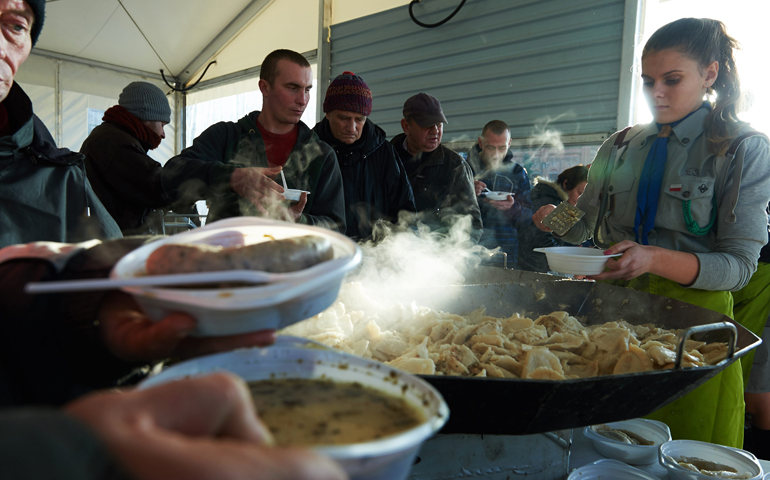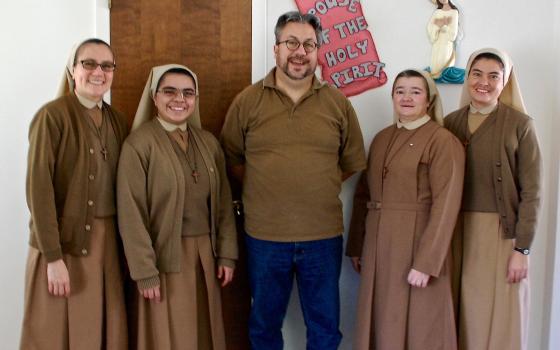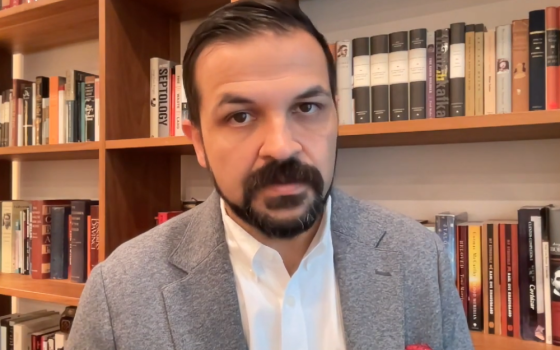
Homeless and the needy receive free meals on Christmas Eve in Gdansk, Poland. (CNS/Adam Warzawa, EPA)
As you may recall a couple of weeks ago, the disciples asked Jesus, "Increase our faith." They were begging him to help them to deepen their life of faith. Then Jesus, over these last couple of weeks, has been showing them and showing us what that means to increase our faith and how we do it. The first thing to remind ourselves of is that when we're talking about faith in this context, it's not simply saying "yes" to a list of doctrines.
Again, it's not just saying, "Yes, I believe in God the Father Almighty," and we say "yes" to all those things. That's an aspect of faith, but it's not what we're talking about really in the Scriptures. Faith is how we relate to God; it's our relationship with God. Faith means that we trust God, we have confidence in God, we know God, and we know God knows us. It's a profound and deep relationship that we keep trying to build on, deepen, and make more real in our lives.
|
Thirtieth Sunday in Ordinary Time |
Today's Scriptures help us to do that. First of all, by reminding us in the first lesson something about God, who God is: God is the judge who shows no partiality. God will not disadvantage the poor, but rather God hears the cry of the poor. God is always looking out for especially those who are the least, the poor, the oppressed. Our God is a God of mercy, does not distain the plea of the orphan, nor the complaint of the widow — the most vulnerable people in that society. God is a God who looks out for them.
The relationship of us to God is also shown in that first lesson: The one who serves God wholeheartedly will be heard. The prayer of the humble person pierces the clouds, and the humble person is not consoled until he or she has been heard, until justice has been done in favor of the righteous. Our God is a God of justice, but that really means a justice that's filled with mercy, a God who is love.
Our response to that is given by St. Paul in our second lesson today. Notice how very much like the Pharisee in the Gospel lesson, Paul starts out his prayer by giving thanks to God for what God has done for him. "I am already poured out as a libation; the moment of my death has come. I have fought the good fight; I have finished the race; I have kept the faith. Now there is laid up for me a crown of justice with which God will fill me on that day and not only me, but all those who have longed for God's glorious coming."
Paul says, "I was rescued from the lion's mouth. God will save me from all evil. Glory be to God forever in heaven." The Pharisee starts out his prayer, "I give thanks to God." That's how Paul starts and that's how we should respond to God. We should respond to God with thanks and praise and love because of what God has done for us. Today if we were to stay after Mass and witness the baptism, we'll see once more how God gives us this visible sign of how God has welcomed this new infant into the world, a gift of life, of existence, and now today, enriched with the life of Jesus in the sacramental sign.
God constantly loves us and our response is to love God. But not only by saying, "Oh my God, I love you with my whole heart and soul, my mind and strength," our act of love — we pray that prayer, but more with our actions. In our actions, we show our love for God by reaching out to one another. That's where the Pharisee went wrong. In that parable, I thank God, yes, for all God has done for me, but then he looks and he says, "And I'm not like that person, that sinner, that no-good, that beggar on the streets. I'm not like them."
That's where the Pharisee went wrong. Just as God has love for each one of us, draws us into existence out of love, sustains us every moment of our lives out of love, God wants us to love our brothers and sisters in the whole human family. One of the things that is the grounding of love for others is that we respect every person. Every person is made in the image of God. Sometimes we forget that; we look down on people.
That's what the Pharisee was doing, "I'm not like those sinners, robbers, adulterers, criminals. No, I'm not like them." He doesn't respect. God wants us to respect one another. That's the beginning of love for others. On a Holy Thursday Mass in the Saginaw diocese a few years ago, Bishop Ken Untener gave an example when he was preaching to the priests at a Mass for priests of what it really means to respect others.
You remember on Holy Thursday, now we restored what we call "the rite of the washing of the feet," what Jesus did at the Last Supper. Remember how he took off his outer robe, put a towel around his waist, then went around and knelt down before the disciples and washed their feet like a slave would wash the feet of the owner. That's what Jesus did. Afterwards Jesus said, "Now I have given you an example that you must do like I do, what I have done."
He said that about the Eucharist after he changed the bread and wine into his body and blood. He said, "Do this in remembrance of me." We do that, don't we? We'll do that today. But this other sign we don't do very often, probably only on Holy Thursday, but it's a profound sign of respect for one another because as Bishop Untener told those priests, "When you're kneeling down in front of someone washing their feet, you cannot look down on them."
Think about it: You can't look down; you look up. You're respecting the person, looking up out of respect for this person. That's what we need to do towards one another in every way. It may be especially towards the poor and the oppressed that we symbolically, or in our thoughts at least, kneel down in front of them, look up to them, and respect them. That's the beginning of love. That's how we have to respond to the love God pours forth upon us; we respond by loving God and loving our neighbor as ourselves. When we begin to treat every person with profound respect, we will have begun to learn the lesson that Jesus is teaching us through the parable of today's Gospel. Never look down upon everyone; look up to them, respect them, give God thanks for what God does for us, but also reach out in love for our brothers and sisters.
[Homily given at St. Philomena, Detroit, Mich. The transcripts of Bishop Gumbleton's homilies are posted weekly to NCRonline.org. Sign up here to receive an email alert when the latest homily is posted.]



